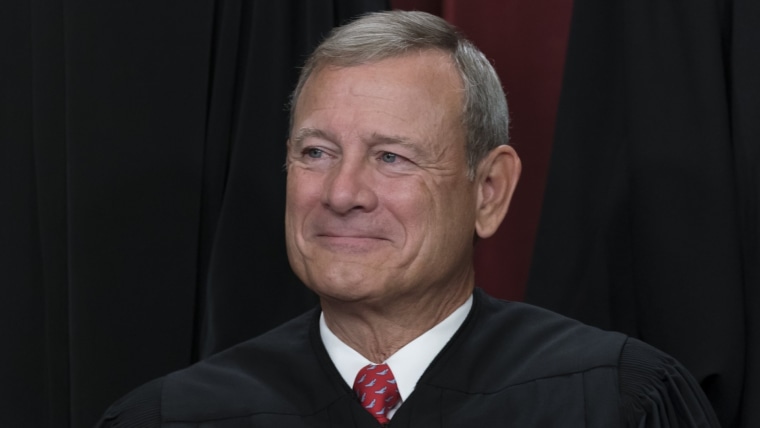A new statement signed by all nine Supreme Court justices stressing their commitment to ethics principles has come under immediate fire for failing to respond to recent calls for the court to adopt a binding code of conduct.
The statement was attached to a letter from Chief Justice John Roberts to Senate Judiciary Chairman Dick Durbin, D-Ill., made public Tuesday, in which he declined an invitation to testify at a committee hearing on the Supreme Court’s ethics rules.
The statement, which notes that the justices “reaffirm and restate” their commitment to ethical principles, falls short on several fronts, legal ethics experts said. Democratic lawmakers were also quick to criticize it.
Several experts faulted the court for doubling down on its decision not to adopt a formal code of conduct when public trust in the institution has plummeted after high-profile ethical concerns as well as a public backlash to some of its rulings on hot-button issues like abortion and guns. The court has a 6-3 conservative majority.
“It’s reflecting kind of a startling level of intransigence given the problems the court’s confronted,” said Charles Geyh, a professor at Indiana University Maurer School of Law, noting that public support for the court had plunged.
District court and appeals court judges are bound by a judicial ethics code that requires judges to “avoid impropriety and the appearance of impropriety in all activities.” Judges who breach the code can be investigated and reprimanded via a separate complaint process.
The Supreme Court, however, has no procedure for complaints to be investigated short of the substantial step of impeachment. The nine justices say they follow the spirit of the code, but they have never adopted one of their own.
On Wednesday, Sen. Angus King, I-Maine, and Sen. Lisa Murkowski, R-Alaska, said they will introduce legislation to require the court to create its own code of conduct as well as appoint an official to review public complaints and publish annual reports disclosing them. A similar bill had already been introduced by Sen. Chris Murphy, D-Conn.
Arthur Hellman, a professor at the University of Pittsburgh School of Law, said that the justices’ statement of ethics is “a step forward,” but insufficient to address ethics concerns that have swirled around the court in recent years. It also serves as a sign that the court has no plan to adopt a binding code of ethics without substantial pressure from Congress, he said.
Stephen Gillers, a professor at the New York University School of Law, said that amending the current code of conduct for the Supreme Court would be “simple” and would pose no threat to the separation of powers.
“There is no excuse for failing to do so,” Gillers said. “While it is true that there is no way sensibly to enforce an ethics code against the justices, that is not a reason not to adopt one. The enforcement will rely on the justices’ honor and respect for the court itself.”
Roberts had been invited to testify at the Senate Judiciary Committee’s May 2 hearing on the Supreme Court’s ethical rules and potential reforms to those rules. But he suggested his participation in the hearing could infringe on judicial independence.
In recent weeks, the court has come under increased scrutiny after a ProPublica report described how Justice Clarence Thomas had accepted gifts and lavish trips from Harlan Crow, a Republican donor and billionaire. Thomas did not disclose the gifts he received from Crow, prompting calls from Democrats on the Judiciary Committee for Roberts to investigate Thomas’ conduct. The justice has since called the gifts “personal hospitality.”
But concerns over ethical lapses by the justices are nothing new. Liberal Justice Ruth Bader Ginsburg came under fire for her heavy criticism of then-Republican presidential candidate Donald Trump during the 2016 election.
Still, conservative justices have faced the most public backlash in recent years, coinciding with the court’s rightward shift. Geyh said that conservative justices may feel they are being “unfairly attacked,” leading them to reject a code of conduct.
“It’s not a conservatives problem, but I think it’s something they perceive as such,” Geyh said.
Roberts’ refusal to engage on the issue appeared to further enrage Democrats, with Sen. Sheldon Whitehouse, D-R.I., saying that the court was engaging in “self-policing” that “has not served the American people well.”
“This new statement of principles has virtually no utility,” Whitehouse said in a statement Tuesday. “There is still no inbox to file a complaint, no process for fact finding, no way of making ethics determinations, and thus no way of holding justices accountable.”
Whitehouse has introduced legislation to create a new procedure to investigate and enforce Supreme Court disclosure rules, becoming one of the latest Democratic senators to do so.
Durbin said that Supreme Court ethics reforms “must happen whether the Court participates in the process or not.”
“I am surprised that the Chief Justice’s recounting of existing legal standards of ethics suggests current law is adequate and ignores the obvious,” Durbin said in a statement responding to Roberts’ letter.
The justices’ statement stipulated that they file the same annual financial disclosure reports as other federal judges do. Allegations of errors in these reports are referred to the Committee on Financial Disclosure, which can send a letter of inquiry to a justice. They follow the same general principles and standards for recusal as other justices do, but the application of the principles can differ due to the court’s unique position, the justices wrote.
Gabe Roth, executive director of the nonpartisan watchdog Fix the Court, said about the justices’ statement: “My main takeaway is that beyond the utter disappointment I have in reading and rereading it, it’s self-contradictory in a really disappointing way.”
“Roberts says he’s looking to ‘address certain recurring issues,’ but it’s the very fact that these issues are recurring that make them so problematic,” Roth added.
#Supreme #Court #draws #fire #ethics #inaction


